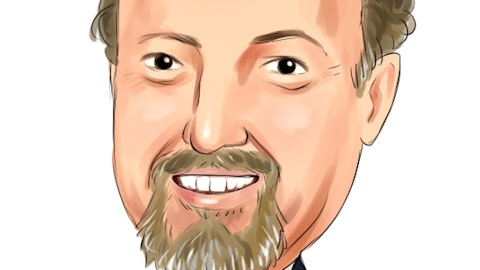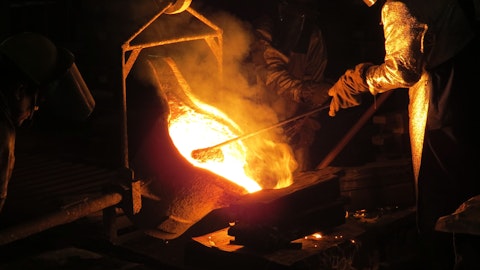Luis Martinez: Well, to begin with the synergies, Daniel, we had detailed this in our Investor Day of more than [BRL500 million], and we’re quite confident that we will obtain this because of the commercial synergies, the increase in volume we already see, as Benjamin mentioned, we are able to provide that nominal capacity in energy as well because of our own synergies and the cost of our self-production inbound logistics and outbound as well, a better reach of our customers and purchase of raw material. So luckily, all of this has happened at the right pace and the amount that we expect. We will now be awarded with two things, an important drop in pet coke, more than 25% of drop in six months, which will help our cash that we use as a metric.
It is almost BRL200 per ton when we began the year, and we’re going to get to the end of the year at BRL160, important reductions of 20% [underway]. The price, we don’t control, but we do think it will increase because of the performance of the construction sector. We have already made some movements [in this May]. So thanks to this combination. We think [indiscernible] 20% margins will increase the levels we had in the past of 30%. That is the magnitude that we would like to deliver with an increase in sales not only a growth of 50% in percentages, but also an increase in sales. And in nominal terms, EBITDA should increase more than that in coming quarters. In terms of cement, this is what I would like to convey. Now to complement Marcelo, Daniel and you cover that sector, and I read a great deal about the reports saying that we have price over volume, volume over price.
And at CSN, we don’t have that. Here are we seeking in truth, we did not have a way out, and I have to explain this. Clearly, there is no magic in this. We acquired a company that has a complementary product portfolio for CSN. Imagine this, I had a portfolio that was 85% to 90% products and bags, and we have a company that fits in with more technical products than ours. Everything was for the retail market, and that had idle capacity and the ability to reduce prices and energy. There wasn’t anything left to do to put equipment to put it working, which is precisely what we did. Yes, we did have to have a market penetration strategy, but we also have to consider when we look at the market as a whole, that this growth was a very responsible one.
It [wasn’t] done at the cost of destroying value quite a contrary. We grew in the market now. We have the highest margin in the sector. And this is interesting. I think this is something we should celebrate. Regarding our price initiatives, yes. We have worked on those initiatives. Now regionally, CSN still has some limitations in some regions. We’re working on this to become more fragmented, and this should happen now with the equipment that we’re putting to work in other regions of Sao Paulo and some regions in the Northeast. In one or two months, after one year with the Company, we will reach the peak of our maximum synergy with operational excellence. From the commercial viewpoint, I’m in 99% of the channels practically very well established in bulk in the technical area.
We cover the sector. I already have a strategy of how to work with the premolding sector. And in the retail area, we have worked with independent distributors and our own [DCs]. It’s not only about looking at the figures, the figures themselves show a very positive evolution. But they’re more positive than we can see in the figure. We could have destroyed value, which is something that did not materialize with the reduction of pet coke and with the values we have attained. We have a much lower cost in our assets, and we have acquired companies with a higher cost that — well, all of this has equaled out. And without a doubt, in the second half of the year, these margins should increase to 25% to 30% due to the cost or price, this fragmenting and because of a better choice of channels for cement.
And this is what I would like to underscore as part of our strategy for the sector, for the growth in the sector.
Daniel Sasson: That was very good.
Benjamin Steinbruch: Daniel, regarding Usiminas, there’s nothing [normal in this]. We’re convinced that they materialize something that we had been speaking about since the entry of Usiminas with a change in control and the change in management. We knew that — well, we knew who was a manager of Usiminas and nothing changes. Everything continues the same. They have activated publicly what we already knew was happening in-house. And what we had said materialized that they were the managers and that they were responsible for Usiminas. We were left outside of this process. We’re just investors, and we continue to wish them much luck, and we hope that they will have good results for the valuation and to pay out dividends for the shareholders.
Operator: The next question comes from Thiago Lofiego from Bradesco BBI.



